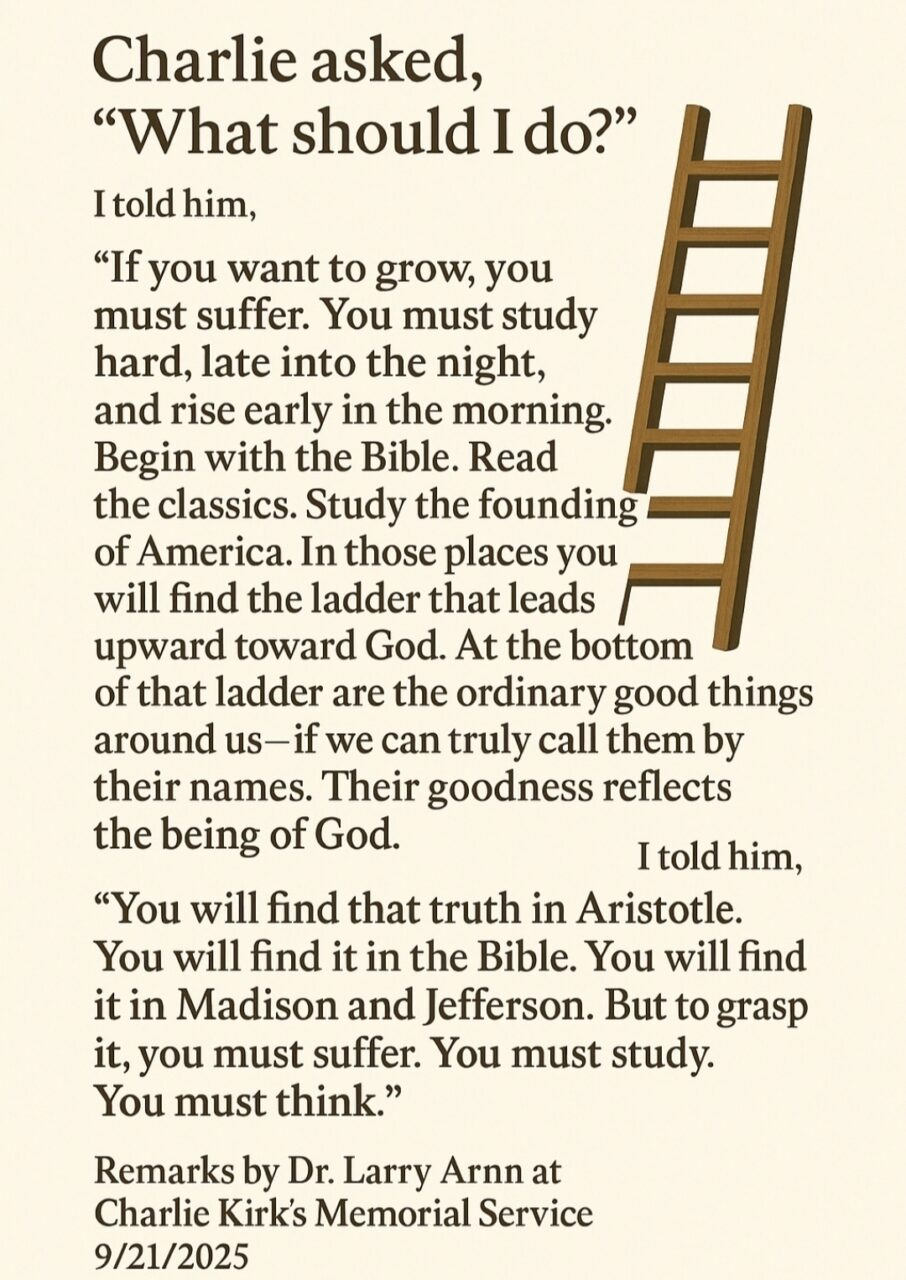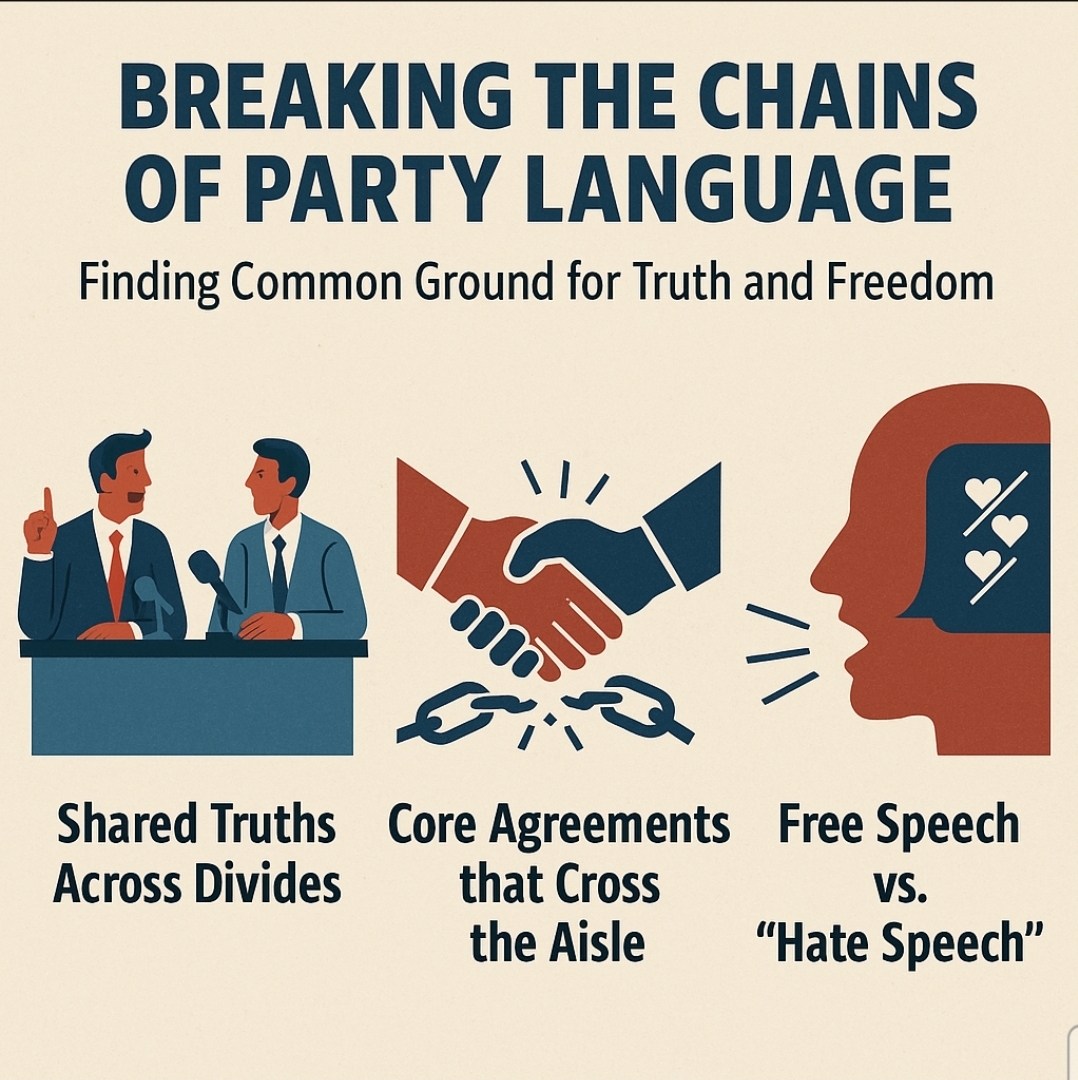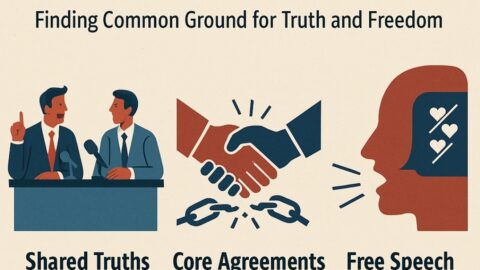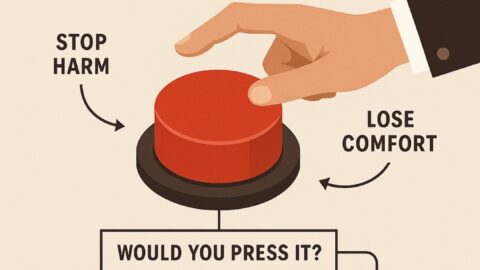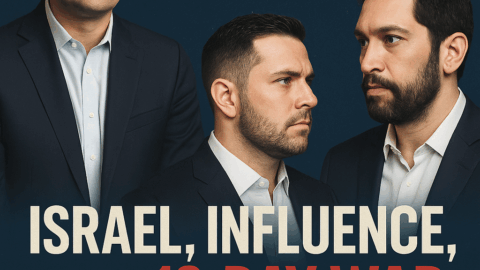America’s Prison (Cage) of Language
America is trapped in a language game. Words like “conservative” and “progressive,” “left” and “right,” “red” and “blue” are no longer tools for understanding reality — they have become weapons of division.
Each label is a script. Once applied, it dictates what you are “allowed” to believe, whom you are “supposed” to hate, and which facts you must ignore. A conservative cannot question Israel without being branded disloyal. A progressive cannot question pharmaceutical power without being branded anti-science. The words have ceased to be descriptions; they are cages.
And while Americans fight over cages, corruption thrives in the open. Lobbyists, banks, intelligence agencies, and corporate media depend on the illusion that our battles are horizontal — neighbor against neighbor — when in reality the true contest is vertical: people against entrenched power.
This is why breaking the chains of party language is not just semantics. It is liberation. The moment we refuse to be defined by red or blue, we begin to see clearly: the Epstein cover-up, foreign lobbying, censorship, endless wars, and economic exploitation are not partisan failures — they are systemic ones.
To stay in the language game is to remain distracted. To break free is to reclaim reality.
Cracks in the Illusion
But cracks in this illusion are forming. The establishment has worked tirelessly to convince Americans that left and right share nothing in common, that progressives and conservatives are destined to fight endlessly while the real levers of power remain untouched. Yet reality keeps breaking through the script.
When Tucker Carlson sat down with Cenk Uygur of The Young Turks — two figures long cast as opposites — they found themselves agreeing on issues that transcend tribal politics. The Epstein list. Israeli influence in U.S. politics. The suspicious circumstances surrounding Charlie Kirk’s death. None of these are “left” or “right” issues. They are questions of truth, power, and accountability.
That moment revealed something deeper: the chains of party language are not unbreakable. When people listen across the divide, they discover that their outrage is often aimed at the same corruption. The differences are real, but the common ground is more threatening to the establishment than any partisan quarrel. Because once Americans realize their shared grievances, the game of divide-and-rule begins to collapse.
The illusion depends on isolation. Break the language chains, and suddenly “red” and “blue” citizens see they have been fighting over shadows while the same elites, donors, and institutions profit at their expense.
The Vocabulary of Division
Party language functions as a control grid. It doesn’t just describe politics — it narrows it. Words like “Republican” and “Democrat,” “conservative” and “progressive,” “hawk” and “dove” are deployed not to illuminate reality but to frame it in ways that benefit the powerful. Instead of asking whether corruption exists, citizens are trained to argue over whether it is “red corruption” or “blue corruption.” Instead of asking who profits from war, we argue whether it is “hawkish” or “dovish.”
This vocabulary works like a script. Once you accept the labels, you are locked inside the play. Each side performs outrage against the other, while both ignore the deeper stagehands — the financiers, lobbyists, intelligence agencies, and corporate cartels who write the lines and set the scenery.
The effect is polarization without progress. People feel politically engaged but are actually caught in a language trap. Labels replace thinking. Debate becomes theater. And accountability disappears, because the system has convinced the audience that rooting for their team is more important than asking who built the stadium in the first place.
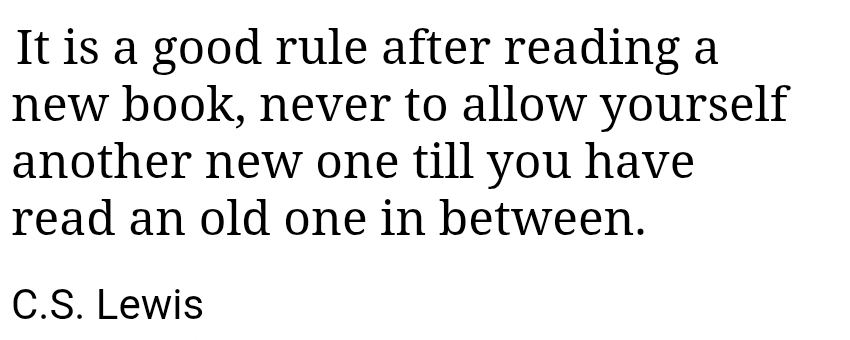
The result is predictable: endless cycles of division, outrage, and distraction — all while the machinery of debt, war, and corruption runs quietly in the background, untouched by partisan slogans.
Shared Truths Across Divides
Strip away the partisan noise and you find that many grievances aren’t left-versus-right at all — they’re human, civic, and institutional. Recognizing those shared truths is the first step toward a politics that answers problems instead of amplifying them.
Core Agreements That Cross the Aisle
- The Epstein affair exposed failures that cut across political loyalties — accountability for elites isn’t a partisan demand, it’s a public good.
- The undue influence of foreign lobbying on American policy is corrosive whether you worry about NATO entanglements or foreign wars; transparency and limits should matter to everyone.
- When a high-profile death looks suspicious or a narrative is rushed, skepticism is not disloyalty — it’s civic prudence. Demanding a full, impartial investigation is a nonpartisan duty.
- The freedom of speech vs. “hate speech” dilemma was at the heart of Charlie Kirk’s fight. Whatever you think of his politics, the principle he defended was clear: citizens must be free to speak unpopular truths without being silenced by shifting definitions of “hate.” Protecting that freedom is not a right-wing or left-wing issue — it’s the foundation of a free society.
Why common ground is threatening to the establishment
The power of tribal politics rests on keeping people divided. When broad swaths of citizens — left, right, and center — agree on basic facts or shared remedies, it undermines the incentives that sustain entrenched interests. That’s why finding and broadcasting shared truths is both an act of courage and an effective strategy for reform.
A short playbook
- Name the shared problem without partisan framing. (e.g., “Elite accountability,” not “their side did X.”)
- List practical, bipartisan remedies (investigations, transparency laws, lobby-registration reform).
- Build small coalitions around single fixes — reform follows organized consensus more often than rhetorical purity.
- Keep the language civic and values-forward: appeal to fairness, duty, and the common good.
Shared truths are the bridge from grievance to policy. If we lean into them, we build a politics that protects normal life — not one that profits from perpetual division.
Free Speech vs. “Hate Speech”: The Weaponization of Language
The Illusion of Safety
“Hate speech” laws and policies are often sold as protection against harm. But once the power to define “hate” is handed to the state, media, or corporate platforms, the line shifts at will. What begins as a shield against slurs quickly expands into a sword against dissent.
From Principle to Precedent
Charlie Kirk’s activism—whatever one thinks of his politics—illustrated this principle. He insisted that speech must be free even when it offends. Otherwise, those in power will always redraw the boundary of what counts as “hate.” Today it may silence your opponent; tomorrow it may silence you.
Shrinking the Public Square
Labeling speech as “hate” collapses debate into accusation. Instead of addressing arguments, elites simply disqualify them. This not only stifles truth-seeking but fractures society, because people retreat into echo chambers where they are “safe” from being de-platformed.
Why Both Sides Should Care
- The left worries about corporate power censoring labor and anti-war voices.
- The right worries about woke bureaucrats censoring religious or cultural voices.
Both are correct. The weapon is the same; only the target changes.

The Civic Duty of Free Speech
Free speech is not permission for cruelty. It is recognition that truth can only be found when all ideas—wise, foolish, offensive, or profound—are allowed into the open. Restricting speech in the name of safety always ends up restricting freedom in the name of power.
Teaching Point: The defense of free speech is not about protecting the loudest or most offensive person in the room. It’s about ensuring that everyone’s voice—including your own—remains safe from arbitrary silencing.
Learning to Read, Learning to Listen
If we are to break free from the chains of party language, we must do more than read headlines or hear soundbites. Mortimer Adler described four levels of reading—and each has a parallel in how we listen and understand. Both are essential if we’re to move beyond division.
- Elementary Reading → Surface Hearing
- Reading: grasping words at face value.
- Hearing: catching phrases and slogans, but not depth.
- Trap: This is where party language thrives. Labels like “left” or “right” are heard, but truth is lost.
- Inspectional Reading → Selective Hearing
- Reading: skimming to decide if you agree or disagree.
- Hearing: cherry-picking soundbites that reinforce what you already believe.
- Trap: This fuels confirmation bias—hearing only what confirms the tribe.
- Analytical Reading → Deep Hearing
- Reading: asking questions, analyzing arguments.
- Hearing: slowing down to ask what do they really mean? What is the principle beneath the rhetoric?
- Breakthrough: At this level, you hear not just party scripts but real concerns, real human stakes.
- Syntopical Reading → Comparative Hearing
- Reading: putting many sources into dialogue.
- Hearing: listening across divides, comparing voices—even those you disagree with—to find shared truth.
- Breakthrough: This is where common ground emerges, because you see patterns bigger than any single party.
Why this matters:
When Americans only read and listen at the first two levels, we stay chained to partisan scripts. To break free, we must climb into analytical and syntopical listening—where conscience overrides tribe, and truth can unite instead of divide.
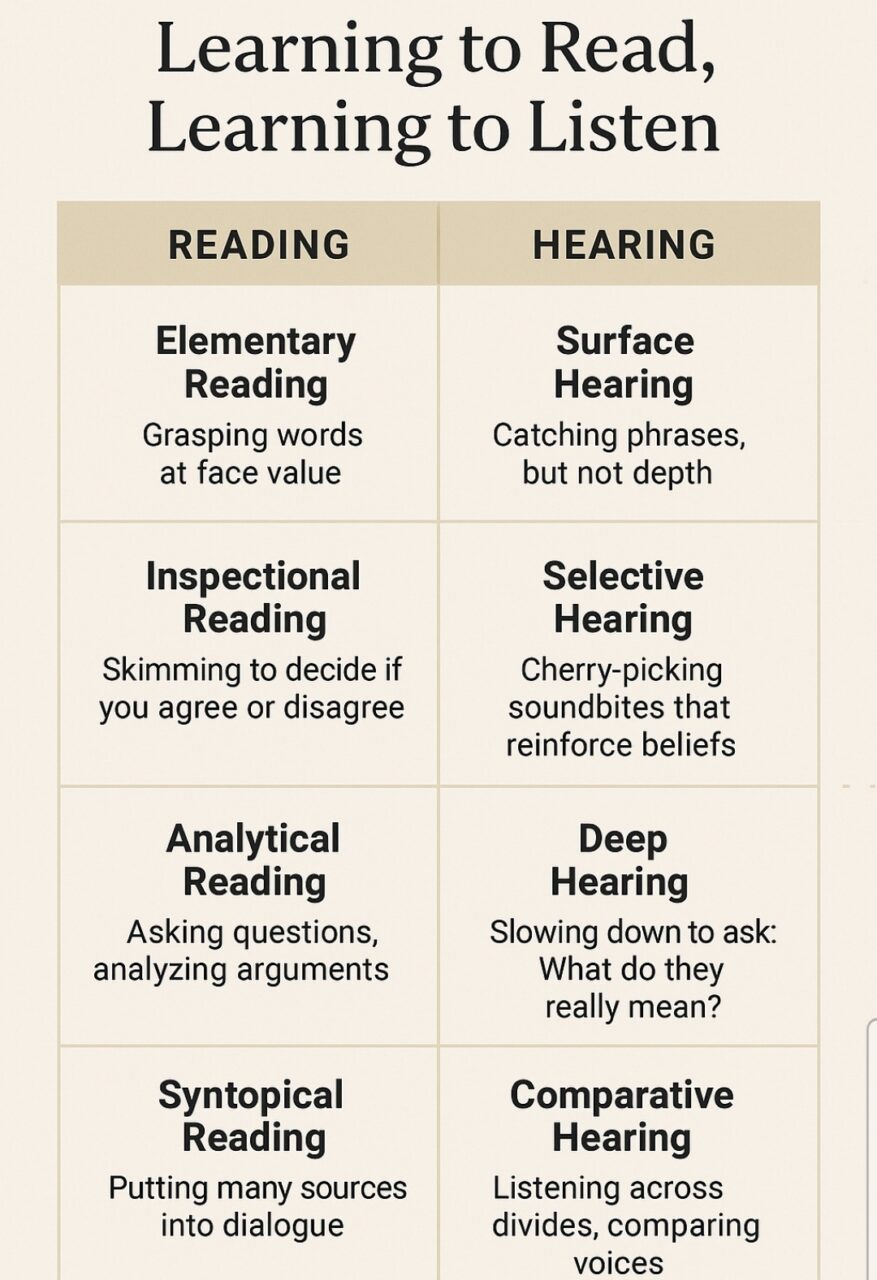
A New Vocabulary of Freedom
Breaking the chains of party language means creating a vocabulary rooted in clarity, not control. It is not just about finding better words; it is about reorienting thought toward truth, dignity, and shared humanity.
Truth over Tribe
Tribalism is seductive because it offers belonging, but it comes at the cost of honesty. A new vocabulary demands that loyalty to facts, evidence, and reality outweighs loyalty to factions. It means admitting when “your side” is wrong and recognizing truth even when it comes from a voice you distrust. Truth is not owned by a party; it is discovered by those willing to listen beyond their echo chamber.
Conscience over Comfort
Comfort lulls us into silence. It makes us ignore what our conscience tells us because speaking up would mean risk — social, financial, or political. Choosing conscience over comfort requires moral courage: calling corruption by its name even when it implicates “your team,” rejecting propaganda even when it flatters your biases, and defending dignity for all lives, not just those convenient to your narrative.
Freedom over Labels
Labels are the handcuffs of thought. They turn people into caricatures — “liberal,” “conservative,” “socialist,” “fascist” — flattening the richness of human experience into propaganda slogans. To choose freedom over labels is to refuse the boxes designed to divide. It is to judge arguments by merit, not by who speaks them. It is to see the person before the category, the principle before the party.
This new vocabulary creates space to see allies where the old one saw only enemies. It reveals that an honest progressive and an honest conservative may have more in common than has with the corrupt establishment. When we abandon the language of division, we gain the freedom to build movements on shared truths instead of scripted hostilities.
Common Ground as Revolution
Common ground is not compromise—it is clarity. When ordinary conservatives and progressives demand transparency, accountability, and justice together, they wield a power greater than any party machine. That’s why the system works so hard to keep us divided.
Breaking Out of the Echo Chamber
If common ground is clarity, then clarity demands that we listen outside the echo chambers of red and blue tribal politics. The establishment thrives when people only consume voices that reinforce their side’s slogans. Real change begins when we expose ourselves to thinkers who disrupt the script — voices that don’t fit neatly into partisan boxes, but instead challenge the system itself.
We should be reading, listening to, and watching sources that refuse to play the party game:
- Investigators and Analysts: Ian Carroll, Liberty Vault, Defending Utah, The Corbett Report, Alex Jones, Reallygraceful, The John Birch Society, The 10th Amendment Center.
- Independent Media & Commentators: Tucker Carlson, Candace Owens, Kim Iversen, Joe Rogan, Russell Brand, Redacted.
- Philosophers and Teachers: Jordan Peterson, Tom Woods, Larken Rose, Mark Passio, Chase Hughes, Tom Bilyeu, Dennis Prager, Jonathan Haidt.
- Truth-Tellers Across the Spectrum: Dave Smith, An0maly, Ron Paul, Bryan Hyde, and the late Charlie Kirk.
This isn’t about agreement with every word. It’s about refusing to let party language dictate what we are “allowed” to consider. Each of these voices chips away at illusions from different angles. By listening widely, testing claims against evidence, and stripping away the partisan costume, we learn a new vocabulary — one rooted in truth, freedom, and conscience rather than tribal allegiance.
Only then can we begin to build the common ground that frightens the establishment most.
The Discipline of Listening: Chase Hughes and Beyond
Chase Hughes, a leading voice on behavioral influence, has argued that the real test of maturity is not in defending our tribe but in choosing to hear the other side. He warns that when we only consume material that flatters our preconceptions, our ability to persuade, adapt, and think critically withers. “Sit with the discomfort of hearing the other side,” Hughes teaches, “because that’s where persuasion begins.”
This isn’t about agreement. It’s about understanding. To break the chains of party language, we must train ourselves to listen without defensiveness and read without prejudice. Only then can we spot where narratives overlap, where truths hide, and where manipulations are most obvious.
That means deliberately seeking out voices that unsettle us. Not only Tucker Carlson, Dave Smith, Candace Owens, Ian Carroll, or Kim Iversen, but also those often cast as “opponents” — like Cenk Uygur and Ana Kasparian of The Young Turks. As the recent conversations between Tucker and Cenk revealed, once you cut through the noise, common ground emerges: concern over elite corruption, foreign lobbying, censorship, and the suspicious circumstances around Charlie Kirk’s death.
When conservatives and progressives alike start practicing Hughes’s discipline of listening — to both independent thinkers and ideological opposites — we create a new language of politics: one rooted not in colors or camps, but in conscience, truth, and shared humanity.
The Call to Action
We can’t keep speaking in the dialect of division. When every conversation begins with “red” versus “blue,” “liberal” versus “conservative,” we’ve already lost. Party language is a cage—it keeps us trapped inside boundaries someone else drew.
What we need is a new vocabulary that names corruption without party filters, that recognizes truth wherever it appears, and that unites conscience over comfort. When a donor manipulates policy, it doesn’t matter if they bought a Republican or a Democrat. When children die in war, it doesn’t matter if the bombs were labeled “left” or “right.” When censorship silences dissent, it doesn’t matter whose algorithm did it. Injustice must be called what it is.
Why Language Shapes Freedom
Mortimer Adler taught that reading happens on four levels:
- Elementary — recognizing the words on the page.
- Inspectional — skimming and summarizing the surface.
- Analytical — digging into meaning, logic, and argument.
- Syntopical — comparing many voices, weighing perspectives, finding truth across differences.
Most political talk today is stuck at the first two levels—party slogans repeated without thought. Real freedom requires analytical and syntopical “reading” of reality: digging into evidence, comparing sources, and daring to listen across divides. Breaking party language is, in essence, learning to think at the highest levels.
Why Morality Demands More
Lawrence Kohlberg showed that moral reasoning also develops in stages:
- At the lowest levels, people act for reward or to avoid punishment.
- At the middle stages, people conform to group loyalty or obey authority simply because “it’s the rule.”
- At higher levels, people act from principle: because it is just, true, and honors human dignity.
Partisan labels lock us in the middle stages—tribal conformity (groupthink) and blind obedience (law-and-order rhetoric). Breaking the chains of party language is a step upward: from obedience and tribalism toward conscience and principle. It asks us to defend truth even when our “side” is guilty, and to recognize integrity even when it comes from someone we usually oppose.
The First Step Toward Freedom
Breaking free from the old vocabulary is more than semantics. Words shape thought. Thought shapes action. If we keep using the language of division, we will keep acting like divided tribes. But if we forge a new vocabulary—truth over tribe, conscience over comfort, freedom over labels—we become citizens again, not pawns.
This is the first step toward freedom: refusing to parrot slogans, daring to name things as they are, and reclaiming the moral maturity to act as free people who can think, speak, and build beyond the party script.
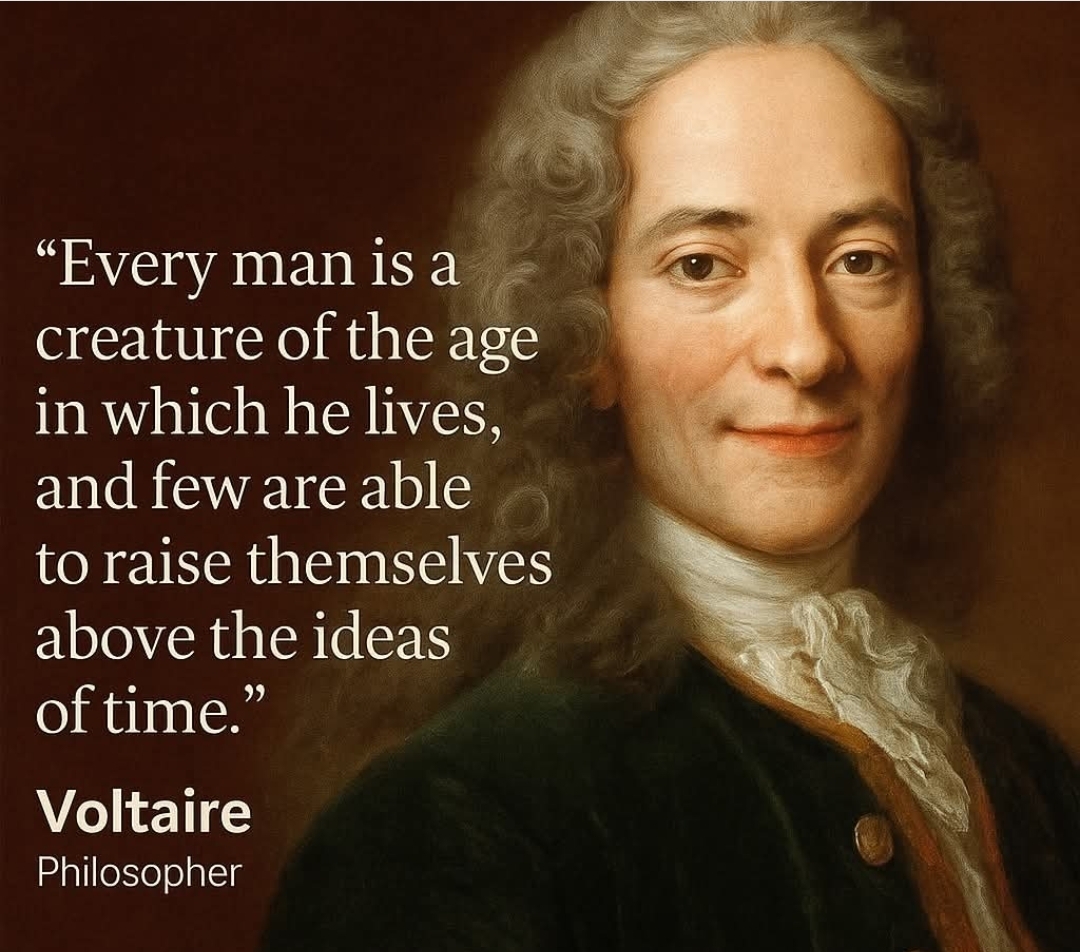
“Every man is a creature of the age in which he lives”
Most people reflect the culture, assumptions, and norms of their time. They absorb the prevailing ideas almost without question—what the society praises, they praise; what society condemns, they condemn. They are “children of their age,” molded by it more than they mold it.
“Few are able to raise themselves above the ideas of the time”
Only a minority can step outside the “water they swim in” and see the bigger picture. These are the rare ones who resist propaganda, tribalism, and inherited assumptions. They rise above fashion, ideology, and peer pressure to think independently. That’s why prophets, reformers, or great thinkers often feel alien, even hated, in their own era.
Application Today:
Media & Propaganda: Most people consume whatever narrative their era feeds them. Few pause to question whether the news, the slogans, or the outrage cycles are manufactured. To “raise yourself above” means to slow down, test claims, and ask: Is this true or just popular?
Politics & Culture Wars: It’s easy to join the left vs. right fight, repeating tribal mantras. Voltaire would say: the deeper challenge is to rise above the age’s partisan assumptions and ask, What’s the principle? Would I defend this if my own side were guilty?
Morality & Faith: Every age has blind spots. Past societies tolerated slavery, child labor, or eugenics because it was “normal.” Our era has its own moral blind spots (comfort, consumerism, digital addiction, institutional corruption). To rise above is to apply a higher moral order—conscience, scripture, natural law—rather than what’s fashionable.
Personal Life: Social media tempts us to fit the mood of the time—ironic humor, rage, or curated perfection. Voltaire’s challenge: step above it. Think: Will this matter in 10 years? Am I living by eternal truths or by this week’s hashtags?
Bottom Line: Voltaire reminds us that most people conform to their age, but real wisdom—and often moral courage—means refusing to be trapped by its illusions. Those who rise above become strange in their own time but essential for the next.
